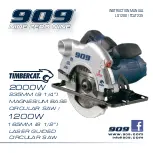
28
GB/IE
14. Troubleshooting
Fault
Possible cause
Remedy
Motor does not work
Motor, cable or plug defective, fuses burnt
Arrange for inspection of the machine by a special
-
ist. Never repair the motor yourself. Danger! Check
fuses and replace as necessary
The motor starts up
slowly and does not
reach operating speed.
Voltage too low, coils damaged, capacitor
burnt
Contact the utility provider to check the voltage.
Arrange for inspection of the motor by a special
-
ist. Arrange for replacement of the capacitor by a
specialist
Motor makes excessive
noise
Coils damaged, motor defective
Arrange for inspection of the motor by a specialist
The motor does not
reach its full power.
Circuits in the network are overloaded (lamps,
other motors, etc.)
Do not use any other equipment or motors on the
same circuit
Motor overheats easily. Overloading of the motor, insufficient cooling
of the motor
Avoid overloading the motor while cutting, remove
dust from the motor in order to ensure optimal cool-
ing of the motor
Reduced cutting power
when sawing
Saw blade too small (ground too much)
Readjust end stop of the saw unit
Saw cut is rough or
wavy
Saw blade dull, tooth shape not appropriate for
the material thickness
Resharpen saw blade and/or use suitable saw blade
Workpiece pulls away
and/or splinters
Excessive cutting pressure and/or saw blade
not suitable for use
Insert suitable saw blade
AC motor
•
The mains voltage must be 230 V~
•
Extension cables up to 25 m long must have a cross-
section of 1.5 mm2.
Connections and repairs of electrical equipment
may only be carried out by an electrician.
Please provide the following information in the event of
any enquiries:
•
Type of current for the motor
•
Machine data - type plate
•
Machine data - type plate
13. Disposal and recycling
The equipment is supplied in packaging to prevent it
from being damaged in transit. The raw materials in this
packaging can be reused or recycled. Never place bat
-
teries in your household refuse, in fire or in water. Bat
-
teries should be collected, recycled or disposed of by
environment-friendly means. The equipment and its ac
-
cessories are made of various types of material, such
as metal and plastic. Defective components must be
disposed of as special waste. Ask your dealer or your
local council.
















































